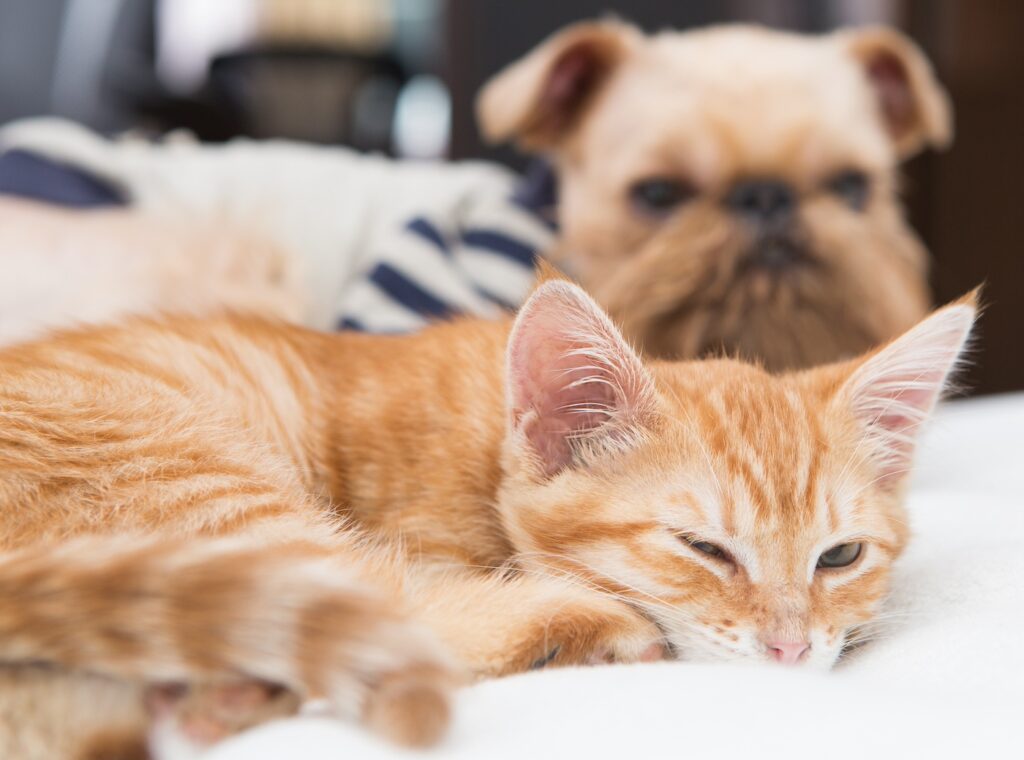Pets & Fireworks: New Year’s Safety

Understanding the Impact of New Year’s Celebrations on Pets
New Year’s Eve is a time for joy and jubilation, but for many pets, it’s a source of anxiety and stress thanks to the dazzling fireworks displays. While we humans revel in the colorful explosions lighting up the sky, our pet companions often find themselves overwhelmed, frightened, and seeking an escape route. However, with some foresight and a little planning for pet safety during fireworks, New Year’s Eve can be a safe and enjoyable time for both you and your pets. Here’s to a Happy New Year!
Leave Your Pets at Home: Their Safest Retreat
New Year’s Eve is typically filled with elements that can compromise your pet’s health and safety. From large crowds and discarded party debris to loud noises, alcohol, and, of course, fireworks, it’s easy to see why home is the safest place for your furry friend.
Pet-Friendly New Year’s Celebrations: Including Your Furry Friends
If you want to spend New Year’s Eve with your beloved companions, here are some pet-friendly ideas to consider:
- Party With Your Pets: Instead of a traditional New Year’s Eve gathering, consider staying in with your pets and watching the New Year’s Eve countdown on television. Plan some fun activities for you and your pets – grab some fun pet-themed decorations and a couple of new toys. This way, you can keep them company and monitor their comfort levels. Spending the evening with your favorite canine or feline is always a recipe for a good time!
- Pet-Approved Treats: Spoil your pets with special treats and toys on New Year’s Eve. You can find pet-safe cookies, chews, and toys that will keep them entertained and happy. Just be mindful of portion sizes to avoid overindulgence.
Create a Pet Haven: Secure and Comfortable
For pets who are crate-trained, the familiarity of their kennel can provide a sense of security. If a crate isn’t an option, select a room where your pet feels most comfortable, close the blinds and turn up the TV or a white noise machine to help keep them away from the bright flashes and booming sounds of fireworks. The continuous noise of fireworks can cause panic in many pets, sometimes driving them to extreme measures to escape the perceived threat.
Happy and Relaxed Pets
Before the evening’s revelry begins, spend a portion of the day engaging your pet in activities like walking, hiking, and play. Physical exhaustion can help your pet remain relaxed and content when the festivities commence.
Lock Up Explosives: Protecting Your Curious Companion
If you have personal fireworks, keep them in a secure location that your pet cannot access. Fireworks can be enticing to inquisitive cats and dogs due to their colorful decorations and appealing scents. However, it’s crucial to remember that most fireworks contain harmful substances, such as potassium nitrate, charcoal, sulfur, and coloring agents, which can be toxic to pets.
Ensure Proper Identification: A Safety Net
Make sure your pet wears their identification tag with up-to-date contact information. Even indoor pets should have a collar and ID in case the loud noises trigger a flight response, prompting them to escape. Microchipping is also highly recommended to help identify them and get them back home if they become lost.
The Soothing Power of Music: The Mozart Effect
Create a calming atmosphere for your pet by playing soothing classical music, providing a comforting backdrop to muffle the sounds of fireworks. The goal is not to drown out the fireworks but to offer a continuous and distracting melody at a regular listening volume.
Alternatively, try a white noise machine, a fan, or a TV program to provide a soothing diversion.
Embrace the Thundershirt: A Sense of Security
Consider using a Thundershirt for your dog or cat, which exerts gentle, constant pressure on your pet’s torso. Much like swaddling a newborn baby, this pressure can help relieve anxiety and create a sense of security and comfort.
Seeking Professional Assistance: Anti-Anxiety Medications
If your pet experiences extreme anxiety, consult your veterinarian to explore whether anti-anxiety medications can help them navigate the noisy holiday season with minimal stress.
As we usher in the New Year, let’s not forget the well-being of our beloved pets. By adopting these New Year’s Eve pet safety measures and embracing pet-friendly alternatives, you can help to ensure that both you and your furry companions enjoy a safe and harmonious transition into the year ahead. Happy New Year!

